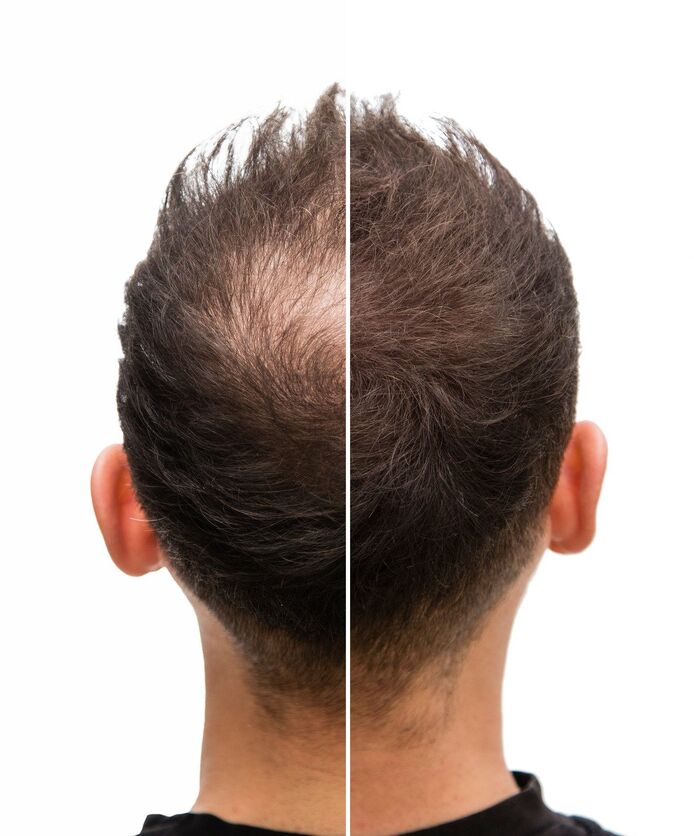How does Propecia work for hair loss?

Male pattern baldness is a common concern for men, affecting over 80% at some point in their lives. While there are a number of ways to treat hair loss, from steroid creams to immunotherapy, the two main treatments are finasteride and minoxidil. Propecia is a branded medication containing 1mg of finasteride and is approved for treatment of male pattern baldness. It encourages new hair growth and reduces further hair loss, particularly in the crown and mid-scalp area.
In this article, we’ll explain exactly what Propecia is and how it works, who it’s suitable for and whether it can restore lost hair.
How does Propecia work?
As mentioned above, Propecia contains finasteride, which works by preventing testosterone from transforming into the hormone dihydrotestosterone (DHT). DHT prevents hair follicles from absorbing the vital nutrients for healthy hair growth, such as iron, zinc, vitamin C and vitamin D. This causes the hair follicles to shrink over time and produce thinner, weaker hair. Eventually, they stop producing new strands altogether, causing baldness.
Propecia works by blocking the enzyme 5-alpha-reductase, which is responsible for converting testosterone into DHT. By reducing DHT levels in the scalp, the medication helps to slow down hair loss and gives existing follicles a chance to recover and grow hair that is thick and healthy.
Clinical studies show that finasteride is effective in 90% of men. Visible results typically begin after three to six months of consistent use. However, because finasteride works by modifying hormone levels, its benefits are only sustained while the medication is taken. Discontinuation usually leads to a reversal of effects within nine to 12 months.
Can women take Propecia?
Put simply, no. Propecia is typically not recommended for women and isn’t approved by the MHRA for female pattern hair loss. This is largely because women naturally have much lower levels of testosterone, and therefore less DHT, meaning finasteride is less likely to provide meaningful results.
It isn’t safe for pregnant women to take Propecia. Finasteride can cause serious birth defects in a foetus if exposed to the drug. This is particularly a concern if the foetus is male as finasteride can lead to abnormal development of male reproductive organs. For this reason, Propecia should never be handled by pregnant women or those trying to conceive.
If you are experiencing female pattern baldness, make sure to speak to your GP about suitable treatment options. For example, they may recommend minoxidil, a topical treatment that can help promote hair growth. There are also various hair care products designed to support healthy hair by boosting essential nutrients.
Can Propecia regrow hair?
Propecia is highly effective at slowing or halting hair loss, but it’s important to manage expectations when it comes to regrowth. While some men experience visible thickening or regrowth - particularly in areas like the vertex (crown) - it is less effective at restoring hair in completely bald areas, such as a severely receded hairline.
This is because once a hair follicle has been dormant or miniaturised for a long period, it may no longer be capable of producing new hair, even if DHT levels are reduced. In these cases, results may be limited to maintaining what hair is left rather than regrowing what’s already gone.
To maximise your chances of success, it's important to use Propecia exactly as prescribed and to continue treatment long term. If you're unsure whether it's right for you, a consultation with a GP or hair loss specialist can help determine the most effective course of action.
Sources:
https://www.nhs.uk/symptoms/hair-loss/
https://onlinedoctor.superdrug.com/hair-loss-treatment.html
https://onlinedoctor.superdrug.com/propecia.html
https://www.nhs.uk/medicines/finasteride/common-questions-about-finasteride/
https://onlinedoctor.lloydspharmacy.com/uk/hair-loss/propecia
https://pmc.ncbi.nlm.nih.gov/articles/PMC6380979/
https://onlinedoctor.lloydspharmacy.com/uk/hair-loss/does-propecia-work
https://www.medicines.org.uk/emc/product/2194/smpc#gref
https://www.oxfordonlinepharmacy.co.uk/blog/who-can-take-finasteride-and-who-cannot
https://www.hshairclinic.co.uk/news/dead-hair-follicles-ultimate-guide
https://www.hairdr.com/boston-hair-loss/why-propecia-works-better-on-the-crown-and-back-of-the-head/

What to Do About the Mounjaro Price...

Does Propecia work?

Switching from Mounjaro to Wegovy:...

What are the side effects of Propecia?

What is Propecia?

